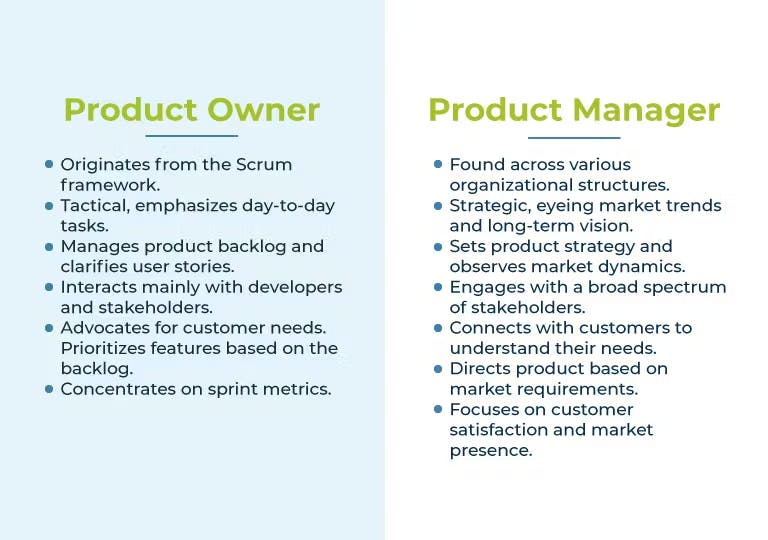Product owner vs Product manager: What's the difference?


Every now and then, people may ask questions like: Is the product owner the same as the product manager? Can one exist without the other? Why do I need a product manager when I have a product owner? Which role is more important in my software development team? What's the real difference between a product owner and a product manager, and how do they impact the outcome of my product?
With the rise of digital products across various sectors, companies are tailoring roles to fit their needs. This has resulted in a range of roles from project managers to product managers, product owners, and software developers. Exactly who does what, when, and how largely depends on the company’s structure, the nature of the product, the project management methodology in use, and the organization's overall vision.
A key difference between a product owner and a product manager is their focus. The product owner is primarily concerned with product backlog management, ensuring the company gets maximum value from the product. In contrast, the product manager usually takes on a more strategic role, overseeing the product throughout its lifecycle.
In larger organizations, it's common to see multiple people handling product management roles. In smaller companies like startups, you might find one person wearing both hats, catering to both the product and business needs. Whether you hire both a product manager and product owner really boils down to your business's specific needs and goals.
Let's explore the difference between a product manager and a product owner and how these roles can be beneficial to your business.
Who is a Product Owner?
A scrum product owner is responsible for the outcome of the software project. They guide the software development team on the product’s vision and goal. Their primary role is to effectively solve problems for users and ensure that the company realizes maximum value from the product.
To do this, the product owner develops user stories to create the product backlog, prioritizing the order of tasks using roadmaps. For the product backlog to be managed effectively, the product owner must present the most important tasks and items so the product development team understands which features to build first. By identifying customer needs and the most crucial requirements, the product owner communicates these to the development team and answers any questions to clarify product goals.
The scrum frameworkscrum framework defines the product owner as the person "responsible for maximizing the value of the product resulting from the work of the development team." Importantly, the product owner is not the owner of the product or the company that launches the product, but the product owner is the person who ensures the product's value is derived.
Product Owner Responsibilities
The product owner plays an instrumental role in the development team, with each task focused on the product goal.
The product owner's responsibilities include:
- Effectively communicating the product goals, the scope of the product, and the needs of the customers to the scrum team.
- Ensuring that the product backlog items are clear and concise so the development team.
- Understanding the pain points of customers and refining their challenges into user stories to create actionable tasks and prioritize them in the product backlog.
- Participating in daily stand-ups and team meetings with the development team and interacting with other crucial roles like the scrum master to ensure the product life cycle adheres to the product roadmap the product manager created.
- Serving as the first point of contact and link between the customer and internal stakeholders. They act as the voice of the customer to the development team.
- Assisting the product manager by communicating constructive customer feedback and insights.
- Facilitating the practice of the agile methodology and understanding product planning.
The product owner collaborates closely with the development team to help build the product, whereas the product manager determines which products should be built.
Who is a Product Manager?
The product manager is responsible for overseeing the product strategy from ideation to launch — with the goal of delivering a unique product to the market that addresses users' needs. They play a vital role in managing the day-to-day activities of the product. Majorly, their role is centered around creating product roadmaps, product strategy, product vision, product development, and product features throughout the product's lifecycle.
In an organization, the product manager communicates a clear vision and strategy to make sure it meets the needs of the customers. They collaborate with cross-functional teams — the engineering team, customer success team, and the sales team. Importantly, a product manager should have empathy for the customer and their challenges to properly communicate this to the development team and make a product that solves users problem.
Product managers define the primary requirements of when, why, what, and how. They are responsible for conducting business analysis, analyzing market trends, communicating with external stakeholders, and working closely with the product owner, project manager, and other team members to release a quality product.
Product Manager Responsibilities
The product manager role is a fundamental part of product success. Unlike the product owner, they're responsible for the entire product lifecycle and how it performs in the market. This role involves creative thinking, problem-solving, and coordinating with different teams.
Essentially, the product manager is responsible for:
- Developing a solid product strategy that captures and sustains the market in the long run.
- Researching the most important product features and gathering customer insights and feedback.
- Ensuring every team member is aligned with the product vision and strategy.
- Serving as an instrumental guide for the product launch and delivering features timely.
- Communicating with external stakeholders and the internal team about the direction of the product.
- Collaborating with vendor partners and developing strategic ways to improve or reduce cost margins. The product manager defines the price list, promotional actions, and other commercial activities for the product.
- Partnering with the product marketing team to create the go-to-market strategy.
- Understanding the ins and outs of the product as well as the level of effort required to build it.
Product Owner vs Product Manager
Identifying the different responsibilities of each role will aid in task assignment and determining who to hire. For small to medium-sized companies in the initial stages of launching their Minimum Viable Product (MVP), hiring a product manager who can manage the product development process might be beneficial. In contrast, a large organization with an agile product team should consider hiring both a product owner and a product manager for successful product delivery and efficient cross-functional team collaboration.
Although there are striking similarities between the roles of a product owner and a product manager, there are clear differences in how they perform their duties within businesses. For example, if your organization uses the agile project management methodology to deliver digital products, you will need a product manager who understands the product strategy and can oversee the product development process, manage timelines, and launch to the market. However, if your team employs the scrum methodology, you would hire a product owner who can maintain the product backlog and create customer stories, acting as the voice of the customer.
Here are some of the differences between a product owner and a product manager:

Is the role of a product owner and product manager the same thing?
Many people confuse the roles of a product owner and product manager, thinking they mean the same thing. However, the product owner and product manager are two distinct roles with different responsibilities. The product owner's role is originally derived from the scrum guide. The scrum framework consists of a product owner, the scrum master, and developers, each with specific responsibilities. On the other hand, the product manager is typically part of the agile product management methodology, focusing on guiding the team throughout the development process. In large organizations, the roles of the product owner and product manager are defined and distinct. Meanwhile, in smaller organizations, the product manager might play both the roles of a product owner and product manager.
Can the product owner and the product manager be the same person?
Simply put, the answer is yes; a product manager can act as a product owner and vice versa. Even though these roles are different, they can be managed by a person who understands the intricacies of product management. In the United States, there are 43,603 product managers employed compared to 6,140 product owners. Agile product managers are in constant demand by many companies, but a common challenge is hiring the right product manager who understands your business. Many companies leverage software vendors like Devsu to find the right fit within 14 days.
Conclusion
From our detailed analysis of what a product owner and product manager are, and the differences between these two roles, it's clear that hiring for each of these roles will depend on the company's product needs and structure. While both are relevant roles, a company might forgo a product owner and focus solely on the product manager since they play a more comprehensive role by overseeing the entire product development. Recognizing and appreciating these differences allows for more efficient team collaboration, clearer communication, and ultimately, the creation of products that deeply resonate with users and achieve business objectives.
How Devsu helps companies achieve product success
When it comes to digital projects, having the right people by your side can make all the difference. By providing product teams and product managers that fit seamlessly with your initiatives, we bring technical expertise. Our agile product managers understand the complexities of the market, from user needs to competitive analysis. With our agile approach, we listen, adapt, and work closely with you to ensure the product developed aligns with your company's vision. Whether you're expanding your existing team or starting a new project from scratch, Devsu is here to assist. Learn more.
Subscribe to our newsletter
Stay informed with the latest insights and trends in the industry
You may also like


